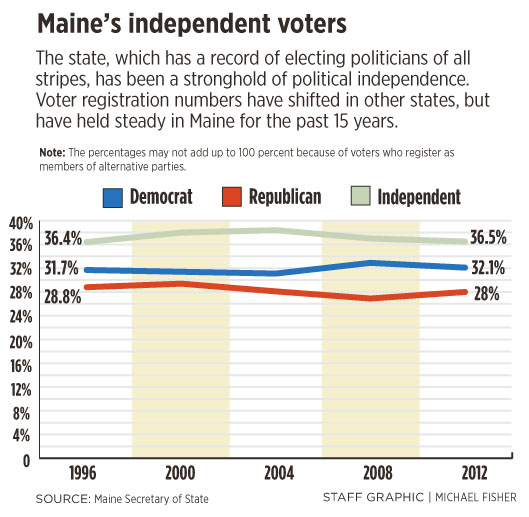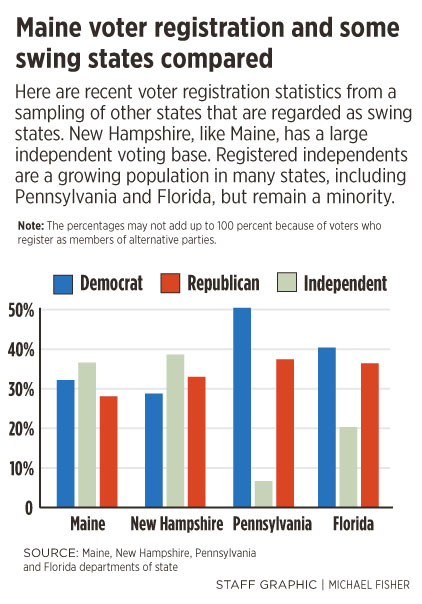Voters in much of the country have been leaving the Democratic and Republican parties and joining the ranks of the unenrolled and independent.
Not here, however.
Maine voters have had a deep independent streak for decades. Other states may simply be catching up, experts say.
An analysis of voter registration patterns shows just why Maine has earned its reputation as a moderate stronghold willing to elect leaders from either party, and sometimes from neither party. The state’s large bloc of unattached voters – a group with more members than both major parties – will once again be a key factor this fall, when Maine fills an open and potentially pivotal seat in the U.S. Senate.
It also is one reason that an independent – former Gov. Angus King – is seen as the candidate to beat. Both Republicans and Democrats already are running against King two months before the June 12 primary to choose their parties’ nominees.
This simply doesn’t happen elsewhere. And it’s no accident.
“People (in Maine) are used to voting for somebody other than the Democrat or Republican, which doesn’t happen in other states,” said L. Sandy Maisel, professor of government at Colby College.
Maine has elected two independent governors in the past 40 years – Jim Longley and King – and nearly elected a third in 2010 – Eliot Cutler. Only a handful of states have ever elected even one.
“An independent gets elevated now and then (around the country), but in Maine it happens often enough that it stands out,” said Morris Fiorina, a Stanford University professor of political science.
Maine also routinely splits its votes. The state now has a Republican governor, two Democratic members of Congress and two Republican U.S. senators.
Maine’s U.S. senators – Olympia Snowe and Susan Collins – happen to be among the most likely to defy party leaders and vote across partisan lines. Snowe has said that the hyperpartisan atmosphere in the Senate is the reason she decided not to seek a fourth term.
John McDonald, an author and storyteller, says political independence has been a Maine trademark at least since the days of Sen. Margaret Chase Smith, R-Maine.
Smith showed her Yankee independent streak in 1950 when she rose on the Senate floor to criticize the anti-communism campaign of Sen. Joseph McCarthy, R-Wis. Mainers approved. Smith would serve another 23 years in the Senate after that.
Maine voters surprised even themselves, however, when they elected Longley as an independent governor in 1974. Everyone expected the winner to be Democrat George Mitchell, who “was probably half moved in” to the Blaine House, McDonald jokes.
The election of a governor with no party was big national news at the time, McDonald recalls. It’s since become expected of Maine voters.
“Even those who belong to a party don’t feel like they’re locked in,” McDonald said. “Nobody likes to be taken for granted, and least of all Maine people.”
Longley’s election started a lasting trend in gubernatorial races.
“In virtually every election since that time, we’ve had a strong independent candidate,” Maisel said. The sole exception is the 1982 race, he said.
Maine’s political nature doesn’t mean independent candidates have a built-in advantage over other candidates. They don’t have a party campaign structure, for example, which is why successful independent candidates also tend to be independently wealthy. And Maine’s unenrolled voters are just as likely to support partisan candidates, especially those with moderate views.
“To win election in Maine, at least in a two-person race, you’ve got to appeal to those voters in the middle,” said Mark Brewer, associate professor of political science at the University of Maine. “(Maine) is one of those purple states where both parties have a chance to win an election statewide.”
Other states are moving in Maine’s direction. Voters in swing states such as Florida and Pennsylvania are gradually shifting out of parties while unenrolled numbers grow.
“That’s the trend pretty much nationwide,” said Doug Lewis, executive director of the Texas-based Election Center, a nonprofit association of state election officials.
Maine’s voter registration patterns have changed little in the past 15 years, however. About 32 percent of voters are Democrats, 28 percent are Republicans and 37 percent are independent. A small number typically belong to alternative parties, such as the Green Independent Party.
Despite the registration numbers, however, there have been subtle changes in Maine voting patterns in recent years. That’s because voters tend to lean toward one party or the other without changing their registration and joining the parties, Brewer said.
The state voted for the Democratic candidate in the last five presidential elections, for example. It had voted Republican in the five elections before that.
Brewer said the long-term Democratic voting trend is likely to continue, despite the election of Republican Gov. Paul LePage in 2010.
“The part of the state where the population is growing (the south and the coast) is the most Democratic part of the state,” he said.
That Democratic voting pattern may be why national observers were quick to predict that Olympia Snowe’s Senate seat would go to the Democrats this fall.
Mainers, however, were not about to be taken for granted.
“People didn’t fully understand outside the state that it didn’t necessarily mean a slam dunk for the Democratic Party,” said John Baughman, associate professor of political science at Bates College.
“We had to wait and see whether an independent candidate came forward.”
It also explains why King’s entry into the race was followed by several top party candidates bowing out, and why King is now the focus of attention from both parties.
The Maine Republican Party issued a recent news release titled “Questions to Ask Angus” and focusing on King’s former wind energy company, which is now connected to a federal investigation of federal loan guarantees.
One Democratic Senate candidate, state Sen. Cynthia Dill, D-Cape Elizabeth, started an online petition demanding that King tell voters which party he would caucus with if elected.
The Maine Democratic Party, meanwhile, sent a message to its members dismissing the anti-partisanship mood. It didn’t mention the Senate race or any specific candidate.
“You are not a Democrat because someone tells you to be one, or because you are beholden to an organization, or because your career depends on it,” Chairman Ben Grant wrote. “What the naysayers refuse to acknowledge is that political affiliation is just shorthand for a set of shared values.”
State House Writer John Richardson can be contacted at 791-6324 or at:
jrichardson@mainetoday.com
Send questions/comments to the editors.




Success. Please wait for the page to reload. If the page does not reload within 5 seconds, please refresh the page.
Enter your email and password to access comments.
Hi, to comment on stories you must . This profile is in addition to your subscription and website login.
Already have a commenting profile? .
Invalid username/password.
Please check your email to confirm and complete your registration.
Only subscribers are eligible to post comments. Please subscribe or login first for digital access. Here’s why.
Use the form below to reset your password. When you've submitted your account email, we will send an email with a reset code.